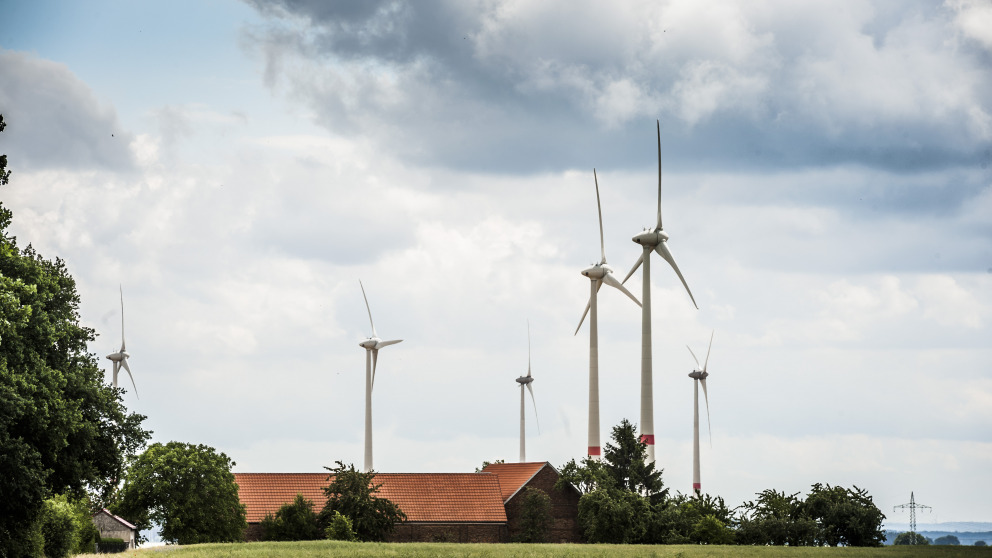Headline:
Small Villages, Big Commitment: IASS Conference Highlights the Role of the Local Level in Global Climate Policy

While climate friendly cities and countries regularly make headlines, the efforts of rural communities do not attract nearly as much attention. Yet they make a major contribution to climate protection. And there are many positive examples of pioneering villages worldwide. A conference held at the IASS on 13 October cast light on their role within the multi-level system of global climate policy.
The citizens of Feldheim in Brandenburg are able to supply themselves with electricity and heat – as generated by wind energy and biogas installations. When their former electricity provider refused to sell them his grid, the locals decided to build their own. Now they are energy self-sufficient and pay much less for their electricity than the rest of the country. “This was possible thanks to incentives and support schemes at various levels, which were then effectively combined at the village level in cooperation with the nearby town,” claimed Martin Jänicke, long-time director of today’s Environmental Policy Research Centre (FFU) at Berlin’s Freie Universität and a senior fellow at the IASS. He emphasised that rural communities have a lot more to gain from the social, economic and ecological side effects of the kind of commitment seen in Feldheim than cities and towns.
Yongsheng Zhang from the Development Research Center of the State Council of the People's Republic of China presented a pilot project for green growth in the Hubei Province. It encompasses an integrated system for cultivating rice and breeding ducks, the promotion of tourism, the construction of passive houses and constructed wetlands, as well as a modern waste disposal system. "Some people see climate protection as a burden, but I'd like to suggest that it can be, in fact, a motor for growth and green economic development," Zhang said. The Internet plays a particularly important role in the pilot project by helping to market not just agricultural produce but also services.
Hans-Josef Fell, the former MP for the Greens (1998–2013) and currently president of the Energy Watch Group, drew attention to the links between ecological and social developments. “Most refugees come from places where the natural environment has been destroyed. This is even the case with regions like California, where people have had to flee their homes because of major forest fires, or Columbia, where entire villages have had to make way for coal mines,” explained Fell. But he pointed out that there were ways of upgrading affected rural areas while also contributing to environmental protection. Examples include the greening of eroded land using biochar from biomass, the cultivation of oily plants in deserts to produce vegetable-oil fuel, and the construction of PV installations on agricultural land. This ensures that land, as a limited resource, is used optimally: areas of land are used to cultivate crops, produce solar energy and provide shade at the same time.
In the light of the urbanisation trend, workshop participants agreed that rural regions need to develop strategies to be able to compete with cities in future. “Rural areas should focus on a unique asset and design an economic development strategy on that basis,” argued Carlo Jäger, Head of Green Growth at the Global Climate Forum. Martin Nesbit from the Institute for European Environmental Policy in London claimed that rural communities would play an increasingly important role, since the land use pressures from new renewable energy infrastructure would require their active consent.
In the concluding discussion Martin Jänicke stressed that effective climate protection increasingly depends on whether cities and rural communities draw up integrated strategies for a secure and climate friendly supply of energy and food. This would require land management that enables the expansion of renewables, agricultural production as well as afforestation of areas for carbon storage. Vincent Kitio from UN Habitat pointed out that rural-urban relations will also be an important topic at the 3rd UN Conference on habitation and sustainable urban development (HABITAT III) in October 2016 in Quito.
Further information:
- Programme of the conference “The local level in multi-level climate and energy governance: the role of rural communities in an urban age”
21.10.2015

